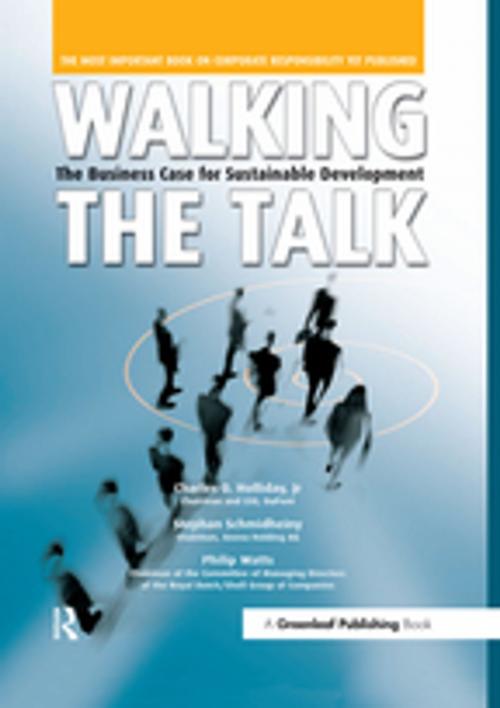Walking the Talk
The Business Case for Sustainable Development
Business & Finance, Business Reference, Business Ethics, Management & Leadership, Planning & Forecasting| Author: | Stephan Schmidheiny, Jr, Charles O. Holliday, Philip Watts | ISBN: | 9781351281942 |
| Publisher: | Taylor and Francis | Publication: | October 19, 2017 |
| Imprint: | Routledge | Language: | English |
| Author: | Stephan Schmidheiny, Jr, Charles O. Holliday, Philip Watts |
| ISBN: | 9781351281942 |
| Publisher: | Taylor and Francis |
| Publication: | October 19, 2017 |
| Imprint: | Routledge |
| Language: | English |
Ten years on from the Rio Earth Summit, world leaders will gather again in Johannesburg for the World Summit on Sustainable Development in September. As planetary anxieties about globalization, poverty and climate change grow, where does the international business community stand? Are they a barrier to change or an engine for it?
One outcome of Rio was Changing Course, the hugely influential book by Swiss industrialist Stephan Schmidheiny, which argued that business needed to be part of the solution to global environmental degradation. Now, Schmidheiny has joined with fellow prime movers in the World Business Council for Sustainable Development (WBCSD – the key business organization focusing on policy research and development in this crucial area), Chad Holliday, Chairman and CEO of DuPont; and Philip Watts, Chairman of Shell; to spell out the real business case for addressing sustainable development as a key strategic issue.
The results are ground-breaking. For the first time, leading industrialists are arguing that not only is sustainable development good for business, the solving of environmental and social problems is essential for future growth. Drawing on a wealth of case studies and personal interviews from business leaders operating around the world, Walking the Talk clearly demonstrates that the vanguard who have operationalized leading-edge environmental and social initiatives are benefiting in a myriad of ways that benefit the bottom line – and the planet. The book argues that the time for rhetoric is over. The business of business has changed. Even more remarkably, the authors insist that a global partnership – between governments, business and civil society – is essential, if accelerating moves towards globalization are to maximize opportunities for all – especially the world's poor. As Chad Holliday recently stated in an address to the United Nations: "Given existing technology and products, for all six billion people on the planet to live like the average American, we would require the equivalent of three planet Earths to provide the material, create the energy and dispose of the waste." Such an option is evidently not available and the book argues that far more eco-efficient and socially equitable modes of development must be pursued in order to allow poorer nations to raise their standards of living.
The solution provided by Walking the Talk is to mobilize markets in favour of sustainability, leveraging the power of innovation and global markets for the benefits of everyone – not just the developed world. This means a further liberalization of the market-a move that would be condemned by anti-globalization protestors. Yet, as the authors argue, business cannot succeed in failing societies. When the global market fails poor countries, where most of the world's people live, it will also eventually fail business. Subsidies for rich countries' products and tariffs against poor countries' products do not constitute a "free" market, or one that best serves people or business. Similarly, governments cannot subsidize fossil fuels or water and expect businesses, or ordinary citizens, to use them efficiently. So, a new, fair and equitable market is needed. A market that can work for all. The authors therefore call on protestors against globalization to stop protesting against the market and instead to campaign instead against the perverse policies that impoverish people and their environment. Walking the Talk explores the opportunities and challenges inherent in eco-efficiency (producing more with less), corporate social responsibility, and a transparent, "wired" world where reputations can be irreversibly damaged – or enhanced – in real time. It also devotes a chapter to ways in which corporations can and must "learn to change". It examines the new partnerships needed among companies, governments, and civil society to produce real change, and the ways in which these alliances can work for all concerned. And it argues that consumer choice and consumer information should be encouraged as a positive force for sustainable development. Only what is valued is carefully used and so creating markets for environmental goods and services may be the best way to protect scarce resources. This is especially true in efforts to mitigate the effects of climate change, where business-like approaches, such as the development of carbon trading, offer workable solutions to policy-makers.
Whether small, medium or large, all businesses must innovate and change to meet the social and environmental challenges of the coming years. Walking the Talk provides a broad set of proven roadmaps to success as well as real-life inspiration for business to embrace the real challenge – to build a global economy that works for all the world's people.
Ten years on from the Rio Earth Summit, world leaders will gather again in Johannesburg for the World Summit on Sustainable Development in September. As planetary anxieties about globalization, poverty and climate change grow, where does the international business community stand? Are they a barrier to change or an engine for it?
One outcome of Rio was Changing Course, the hugely influential book by Swiss industrialist Stephan Schmidheiny, which argued that business needed to be part of the solution to global environmental degradation. Now, Schmidheiny has joined with fellow prime movers in the World Business Council for Sustainable Development (WBCSD – the key business organization focusing on policy research and development in this crucial area), Chad Holliday, Chairman and CEO of DuPont; and Philip Watts, Chairman of Shell; to spell out the real business case for addressing sustainable development as a key strategic issue.
The results are ground-breaking. For the first time, leading industrialists are arguing that not only is sustainable development good for business, the solving of environmental and social problems is essential for future growth. Drawing on a wealth of case studies and personal interviews from business leaders operating around the world, Walking the Talk clearly demonstrates that the vanguard who have operationalized leading-edge environmental and social initiatives are benefiting in a myriad of ways that benefit the bottom line – and the planet. The book argues that the time for rhetoric is over. The business of business has changed. Even more remarkably, the authors insist that a global partnership – between governments, business and civil society – is essential, if accelerating moves towards globalization are to maximize opportunities for all – especially the world's poor. As Chad Holliday recently stated in an address to the United Nations: "Given existing technology and products, for all six billion people on the planet to live like the average American, we would require the equivalent of three planet Earths to provide the material, create the energy and dispose of the waste." Such an option is evidently not available and the book argues that far more eco-efficient and socially equitable modes of development must be pursued in order to allow poorer nations to raise their standards of living.
The solution provided by Walking the Talk is to mobilize markets in favour of sustainability, leveraging the power of innovation and global markets for the benefits of everyone – not just the developed world. This means a further liberalization of the market-a move that would be condemned by anti-globalization protestors. Yet, as the authors argue, business cannot succeed in failing societies. When the global market fails poor countries, where most of the world's people live, it will also eventually fail business. Subsidies for rich countries' products and tariffs against poor countries' products do not constitute a "free" market, or one that best serves people or business. Similarly, governments cannot subsidize fossil fuels or water and expect businesses, or ordinary citizens, to use them efficiently. So, a new, fair and equitable market is needed. A market that can work for all. The authors therefore call on protestors against globalization to stop protesting against the market and instead to campaign instead against the perverse policies that impoverish people and their environment. Walking the Talk explores the opportunities and challenges inherent in eco-efficiency (producing more with less), corporate social responsibility, and a transparent, "wired" world where reputations can be irreversibly damaged – or enhanced – in real time. It also devotes a chapter to ways in which corporations can and must "learn to change". It examines the new partnerships needed among companies, governments, and civil society to produce real change, and the ways in which these alliances can work for all concerned. And it argues that consumer choice and consumer information should be encouraged as a positive force for sustainable development. Only what is valued is carefully used and so creating markets for environmental goods and services may be the best way to protect scarce resources. This is especially true in efforts to mitigate the effects of climate change, where business-like approaches, such as the development of carbon trading, offer workable solutions to policy-makers.
Whether small, medium or large, all businesses must innovate and change to meet the social and environmental challenges of the coming years. Walking the Talk provides a broad set of proven roadmaps to success as well as real-life inspiration for business to embrace the real challenge – to build a global economy that works for all the world's people.















